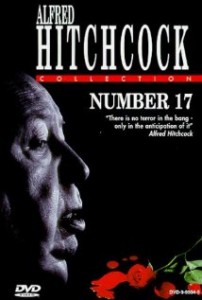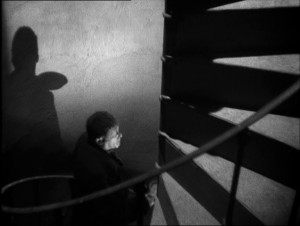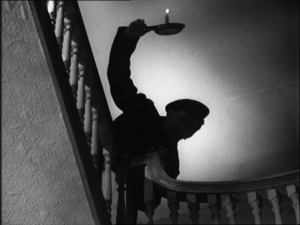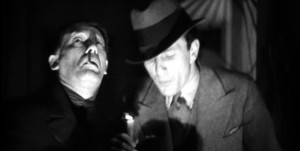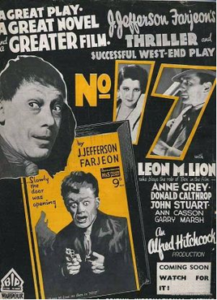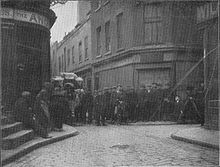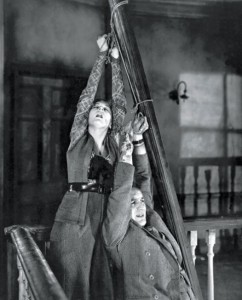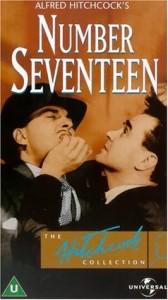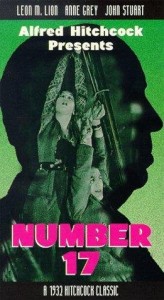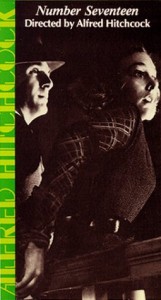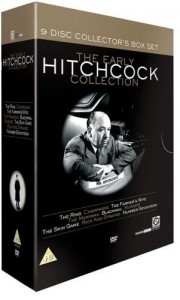Number Seventeen **** (1932, John Stuart, Anne Grey, Leon M Lion) – Classic Movie Review 573
John Stuart stars as police detective Gilbert Fordyce, who is searching for a necklace and is on the trail of a gang of clever jewel thieves who stole it, in Alfred Hitchcock’s vintage 1932 British thriller film Number Seventeen.
In Alfred Hitchcock’s vintage 1932 British comedy suspense thriller film Number Seventeen, John Stuart stars as police detective Gilbert Fordyce, who is searching for a necklace and is on the trail of a gang of clever jewel thieves who stole it. He believes he has discovered their hideout– an old empty house near a railway depot in London, with the railway leading to the English Channel. The film’s title is of course the house’s street number.
With the help of a female member of the gang, Nora (Anne Grey), and an old tramp named Ben (Leon M Lion), who has disturbed the gangsters, Detective Fordyce sets out to recover the jewel and bring the crooks to book.
This early talkie Hitchcock thriller is a very enjoyable short feature at only 64 minutes, offering familiar Hitchcock themes, ideas and obsessions in embryo form, stylish visual flair and considerable entertainment value.
The downsides are that it is quite melodramatic, creaky and dated, artificially set bound and was obviously cheaply made, all stiflingly in the studios of British International Pictures at Borehamwood, Hertfordshire. Its climactic train and bus chase is astonishingly no more than a film of a toy train set, with extensive use of miniatures, including the model train, bus and ferry. However, the whole movie is skilfully photographed and edited, and a lot of fun to watch.
Certainly the film does have a lot of vitality, though, and its story and handling point the way ahead for Hitchcock to the triumphs of The 39 Steps and The Lady Vanishes. The very talky, static first section in the house is all too clearly from the hit 1925 stage play (by Joseph Jefferson Farjeon) that it is based on.
As usual, Hitch and his wife Alma Reville worked on the scenario, this time along with the screen writer and stage actor Rodney Ackland. So, accordingly, the dialogue is not too bad at all.
‘A disaster,’ admitted Hitch in François Truffaut’s 1966 interview book Hitchcock/Truffaut. ‘It reflected a careless approach to my work. A terrible picture… very cheap melodrama.’ But history will be kinder to it than that. It’s a fun, interesting curio, admittedly mainly for old movie buffs and especially for Hitchcock completists.
François Truffaut told Hitchcock he had found his film ‘quite funny, but the story was rather confusing.’
Like several of his early films, we would not be watching them now unless they had his name on them. But that is a good excuse to enjoy some antique cinema.
It is Hitchcock’s last film as director for British International Pictures, who compelled him to make Number 17 after the financial failure of his previous film Rich and Strange (1931). British International Pictures boss John Maxwell assigned Hitchcock to make the film but Hitch was unhappy with it, thinking the story full of clichés. His mind was on something else. He had returned to England from a trip to the Caribbean with a new idea for a film and had pitched it John Maxwell, but no dice.
The cast are John Stuart as Barton the Detective. Anne Grey as Nora, the ‘Deaf-Mute’ Girl, Leon M Lion as Ben, Donald Calthrop as Nora’s escort Brant, Barry Jones as Henry Doyle, Ann Casson as Rose Ackroyd, Henry Caine as Mr Ackroyd, and Garry Marsh as Sheldrake.
Number Seventeen is directed by Alfred Hitchcock, runs 64 minutes, is made by British International Pictures/ Associated British Picture Corporation, is distributed by Wardour Films, is written by by Alfred Hitchcock, Alma Reville and Rodney Ackland, based on the play Number Seventeen by Joseph Jefferson Farjeon, is produced by John Maxwell, is shot by Jack Cox and Bryan Langley, is scored by Adolph Hallis.
Release date: 18 July 1932 (London).
The opening credits confirm the title as Number Seventeen, and not Number 17.
Leon Marks Lion (12 March 1879 – 28 March 1947) had starred on stage in Farjeon’s 1925 hit play Number Seventeen.
Despite being copyrighted worldwide, Number Seventeen has been widely bootlegged, but now it is restored on DVD, streaming and Blu-ray.
© Derek Winnert 2013 Classic Movie Review 573
Check out more reviews on http://derekwinnert.com/
Hitchcock (above right) during the making of his ill-fated first directing project Number 13 in 1922 in London. The production was cancelled because of financial problems.

